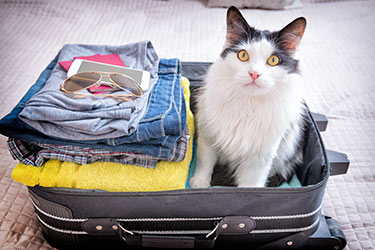National Pet Travel Safety Day

Make pet travel safety a priority.
In observance of National Pet Travel Safety Day on January 2, offer your clients a few tips on traveling safely with their pets.
Planes, trains, or automobiles?
In a pet passenger survey conducted by AAA and Kurgo, 56% of dog owners reported driving with their dog in a vehicle on a monthly basis. Of those respondents, 29% admitted to being distracted by the actions of uncrated pets.
The rules for traveling by car are simple; it is safer for everyone when animals are crated in the back seat of a moving vehicle. Long trips require frequent stops for stretching and bathroom breaks, and animals should never leave the vehicle without a collar, ID tag, and leash. Recommend traveling with another person to help with any pet needs along the way.
For clients who plan to travel by air, there are more details to consider. According to The Humane Society of the United States (HSUS), traveling by plane can be very risky for a pet. Driving is always a better option, but when flying is necessary, suggest the following:
- Be proactive. Call the airline far in advance to ask if you can keep your pet in the cabin of the plane. Many airlines limit the number of animals per flight; therefore, the sooner you contact the airline, the better.
- Know the size limitations as well as the carrier and vaccination requirements.
- Avoid the cargo hold and stick to direct flights if at all possible.
- Never board a brachycephalic animal in the cargo holds. They are more sensitive to changes in air quality and pressure. Certain airlines have banned the travel of short-nosed dogs entirely.
- Give your pet at least a month of crate training before carting him/her through an airport and onto a plane in a crate.
- Avoid busy travel times if possible.
- Consider temperature extremes before boarding a pet in the cargo hold.
- Most importantly, if you must board your pet in the cargo hold, let the captain or a flight attendant know as you board the plane.
Traveling by train is uncommon in the United States, but the HSUS currently supports the Pets on Trains Act, which will allow pets to travel on Amtrak for a fee. If your client is headed to Europe, where travel by train is common, assure them that most European countries allow pets on trains with little regulation.
Up-to-date on vaccinations?
As veterinarians, you understand the importance of vaccinations. For the clients who plan to board their pets while traveling, revisit the necessary vaccinations, such as Bordetella. Check to see if your client needs a Certificate of Veterinary Inspection for proof of vaccinations and/or illnesses that require special accommodations.
Destination is important!
Has your client considered how the travel destination may affect their beloved pets? You may be able to recommend certain precautions or vaccinations depending on the location.
The highly contagious canine H3N8 influenza was first identified in Florida in 2004. Eleven years later canine H3N2 influenza was discovered for the first time in the Chicago area. Both strains have since been detected in the majority of states across the country. Many pet owners aren’t yet of aware of the threat of canine flu or its vaccine.
Lyme disease is a danger to both humans and animals. It is most common in the Northeast and Great Lakes area. For clients traveling to these areas, particularly those planning outdoor excursions, you might recommend vaccination. Similarly, if you have a client planning outdoor trips anywhere, you probably want to recommend Lepto vaccination for dogs exposed to standing water and wildlife. It is never a bad idea to ask your clients where they plan to travel and give your best recommendations to keep their four-legged family members safe.
The American Veterinary Medical Association webpage published an article offering answers to important travel questions you many receive from your clients.
Contact your Covetrus representative for more information at 855.724.3461 or online.
Sources:
https://www.avma.org/public/PetCare/Pages/Short-nosed-Dogs-and-Air-Travel-FAQs.aspx
https://www.congress.gov/bill/114th-congress/house-bill/674
https://www.avma.org/KB/Resources/Reference/Pages/Canine-Influenza-Backgrounder.aspx
https://www.americanhumane.org/fact-sheet/vaccinating-your-pet/
https://www.avma.org/public/PetCare/Pages/Traveling-with-Your-Pet-FAQs.aspx
Careers
Are you looking for a place to let your talents shine? At Covetrus, we help our practitioner customers better serve their patients and take pride in providing the best customer experience possible. Search our open positions to see our available opportunities.
Newsletter
Stay current with what’s going on with Covetrus, subscribe to receive our newsletter and email communications. Subscribers will receive the latest information in practice management, sales and marketing, animal health, and more.


Leave a comment